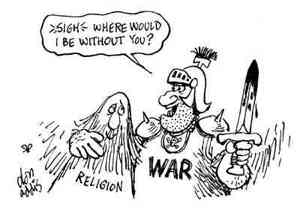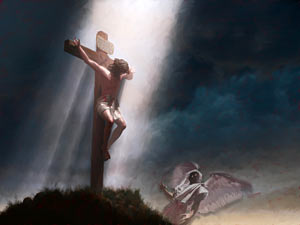Yesterday we looked at the idea of God as a divine scapegoat. We pick up with this idea today, showing how Jesus also was a divine scapegoat. He not only revealed to us what God had been doing all along, but also unmasked the scapegoat mechanism for all to see. Through Jesus, we see the truth of violence, that it comes from us, and not from God.

The way many Christians have come to understand and explain the crucifixion of Jesus, it almost seems as if God Himself was to blame for this violent act as well.
Did God Need an Innocent Victim To Suffer for the Sins of the World?
A large swath of Christian theology teaches that God sent Jesus to die on the cross, that it was God Himself who wanted an innocent victim to die for the sins of the whole world. Many forms of traditional Christianity even state that the only reason the death of Jesus could atone for the sins of the whole world is because He was an innocent victim.
In other words, one prominent and popular explanation for the crucifixion of Jesus was that God needed an innocent victim to pay for the sins of the world, and since the innocent victims of bulls and goats could not perfectly accomplish what God desired, God instead had to send the ultimate innocent victim, His only Son Jesus Christ, to pay for the sins of the whole world.
 This interpretation of the cross makes God once again the violent perpetrator of this most violent of crimes. According to this view, God ordained the death of His Son because God demands the blood sacrifice of an innocent victim to appease His anger toward sin.
This interpretation of the cross makes God once again the violent perpetrator of this most violent of crimes. According to this view, God ordained the death of His Son because God demands the blood sacrifice of an innocent victim to appease His anger toward sin.
The Scriptures, however, paint a quite different picture.
We Killed Jesus as a Scapegoat for our own Sin and Shame
Jesus came to occupy an all-too-humanly constituted place of shame, violence, and death, and not hold it against us. There is an angry deity in this equation, and it is us, in whose midst God, quite without violence, manifests the depth of his forgiving love by plumbing the depths of, and thus defanging, our violence (Alison, We didn’t invent sacrifice).
Instead of God demanding a blood sacrifice to satisfy His wrath toward sinful humanity, Scripture indicates that it was mankind who put Jesus to death on the cross.
It was we who continued our age-old crime of scapegoating an innocent victim to appease our own guilty conscience.
We were the violent ones, and Jesus submitted Himself to our violence to both expose it and neutralize it once and for all.
Jesus went willingly to the cross, not because a blood sacrifice was necessary to pay the penalty for sin, but because going to the cross unmasked the scapegoat mechanism, revealed the violence inherent within the heart of men, exposed the myth of redemptive violence, and brought an end to the war that men had waged on God for centuries.
Unveiling the Power of Sin
 On the cross, Jesus removed the veil from the power of sin.
On the cross, Jesus removed the veil from the power of sin.
On the cross, Jesus laid bare for all to see the lie that violence toward an innocent victim helps alleviate the curse of sin and constant spiral of violence.
On the cross, Jesus showed us once and for all that God is not violent, but, quite to the contrary, has been taking upon Himself the violence of the whole world.
In Jesus, “God is revealed as the ‘arch-scapegoat,’ the completely innocent one who dies in order to give life. And his way of giving life is to overthrow the religion of scapegoating and sacrifice” (McDonald, Violence & The Lamb Slain).
 How can a God who says "Love your enemies" (Matthew 5:44) be the same God who instructs His people in the Old Testament to kill their enemies?
How can a God who says "Love your enemies" (Matthew 5:44) be the same God who instructs His people in the Old Testament to kill their enemies?
These are the sorts of questions we discuss and (try to) answer in my online discipleship group. Members of the group can also take ALL of my online courses (Valued at over $1000) at no charge. Learn more here: Join the RedeemingGod.com Discipleship Group I can't wait to hear what you have to say, and how we can help you better understand God and learn to live like Him in this world!







 I tend to write my books on my blog. I do this for various reasons, one of which is that I desire input, questions, and suggestions from readers. The following posts are from my book When God Pled Guilty, which is an examination of how to understand the violent actions of God in the Old Testament in light of Jesus Christ, and especially, Jesus Christ dying for His enemies on the cross.
I tend to write my books on my blog. I do this for various reasons, one of which is that I desire input, questions, and suggestions from readers. The following posts are from my book When God Pled Guilty, which is an examination of how to understand the violent actions of God in the Old Testament in light of Jesus Christ, and especially, Jesus Christ dying for His enemies on the cross.
 In
In  So by causing violence to be ascribed to God, and by using violent religion to “cast out Satan,” Satan had developed the perfect cycle of violence from which there seemed to be no escape. When bad things happened, it was God’s fault. And when God sent messengers to proclaim His truth and love, Satan vilified them until they too were killed in the name of God. This beautiful lie was perpetrated upon the world and carried out in plain view over and over and over since time began.
So by causing violence to be ascribed to God, and by using violent religion to “cast out Satan,” Satan had developed the perfect cycle of violence from which there seemed to be no escape. When bad things happened, it was God’s fault. And when God sent messengers to proclaim His truth and love, Satan vilified them until they too were killed in the name of God. This beautiful lie was perpetrated upon the world and carried out in plain view over and over and over since time began. For all of human history, Satan cast out Satan so that he might continually reinforce his own power, and reinsert himself into human structures and institutions, forever consolidating and expanding his own power and dominion over God’s creation. But when he tried it with Jesus, he failed to recognize that he was snatching defeat from the jaws of victory.
For all of human history, Satan cast out Satan so that he might continually reinforce his own power, and reinsert himself into human structures and institutions, forever consolidating and expanding his own power and dominion over God’s creation. But when he tried it with Jesus, he failed to recognize that he was snatching defeat from the jaws of victory.
 One of the great lies of Satan is in how he uses human institutions such as religion and politics to make it look like God uses violence to defeat violence. This is the great myth of redemptive violence, which is seen in almost every movie, story, and legend of history, as well as within every daily newspaper and every nightly news broadcast.
One of the great lies of Satan is in how he uses human institutions such as religion and politics to make it look like God uses violence to defeat violence. This is the great myth of redemptive violence, which is seen in almost every movie, story, and legend of history, as well as within every daily newspaper and every nightly news broadcast.